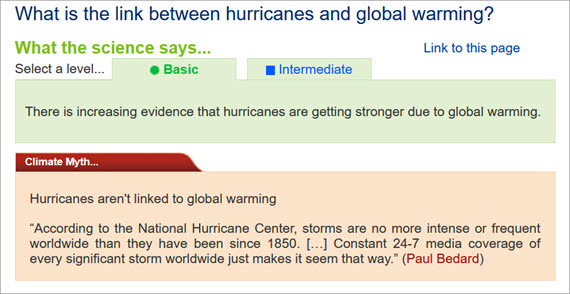At a glance - What is the link between hurricanes and global warming?
Posted on 28 May 2024 by John Mason, BaerbelW, Ken Rice
On February 14, 2023 we announced our Rebuttal Update Project. This included an ask for feedback about the added "At a glance" section in the updated basic rebuttal versions. This weekly blog post series highlights this new section of one of the updated basic rebuttal versions and serves as a "bump" for our ask. This week features "What is the link between hurricanes and global warming?". More will follow in the upcoming weeks. Please follow the Further Reading link at the bottom to read the full rebuttal and to join the discussion in the comment thread there.
At a glance
Hurricanes, Cyclones or Typhoons. These are traditional terms for near-identical weather-systems. The furious storms that affect the tropics have a fearsome reputation for the havoc they bring. Such storms are driven by the heat of the tropical oceans, where sea surface temperatures vary by just a few degrees Celsius and are almost always in the high twenties. Hurricane formation can only take place at such temperatures.
In the Atlantic, for example, a tropical storm-system begins life as a developing wave of low pressure tracking westwards out of Africa. Offshore in the tropical Atlantic, the warmth of the ocean's surface drives intense evaporation. That warmth and moisture provide the fuel for thunderstorm development.
Most such waves simply carry clusters of disorganised showers and thunderstorms. But in some, the storms organise into rain-bands. Once that happens, low-level warm and moist air floods in towards the low pressure centre from all compass points. But it does so in an inward spiralling motion. Why? That's due to the Coriolis Effect. Because the Earth rotates, circulating air is deflected to the right in the Northern Hemisphere, resulting in a curved path. In the Southern Hemisphere the air is deflected to the left. The effect is named after the French mathematician Gaspard Gustave de Coriolis (1792-1843), who studied energy transfer in rotating mechanical systems, such as waterwheels.
The other essential ingredient required to form and keep a hurricane going is low wind shear. Wind shear is defined as winds blowing at different speeds and in different directions at different heights in the Troposphere - the lower part of our atmosphere where weather occurs. For a hurricane, wind-shear of less than 10 knots from the surface to the high troposphere is perfect.
With those ingredients in place, an organised cluster of thunderstorms may spin up into a tropical depression. If conditions favour further development, a tropical storm will form and then strengthen into a hurricane. A hurricane has a minimum constant wind speed of 119 kilometres per hour (74 mph). The most intense Category 5 storms have sustained winds of more than 252 kilometres per hour (157 mph). Highest winds are typically concentrated around the inner rainbands that surround the hurricane's eye.
So, given the above, what will a warmer world result in?
It's a bit of a mixture due to the number of variables involved. The number of storms reaching Category 3-5 intensity is considered to have increased over recent decades. That's because warmer sea surface temperatures give a storm more fuel. In contrast, the number of individual systems in a given year appears to have decreased although the jury's still out on that. But one thing is a lot more certain. Extreme rainfalls.
There's a simple, memorable formula that describes how warmer air can carry more moisture: 7% more moisture per degree Celsius of temperature increase. Hurricanes already dump vast amounts of rain: in a warmer world that amount will only increase. Allowing further warming to take place simply makes an already bad situation worse.
Please use this form to provide feedback about this new "At a glance" section. Read a more technical version below or dig deeper via the tabs above!
Click for Further details
In case you'd like to explore more of our recently updated rebuttals, here are the links to all of them:
If you think that projects like these rebuttal updates are a good idea, please visit our support page to contribute!































 Arguments
Arguments































Comments